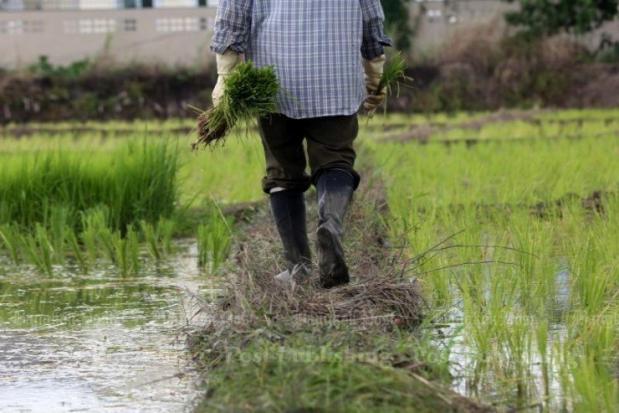
With a year still left in office, Prime Minister Prayut can concentrate on problems in agriculture - particularly the plight of rice farmers. (File photo)
With just about one year left in office, Prime Minister Prayut Chan-o-cha and his government will have to give a high priority to existing problems in agriculture -- especially the falling price of rice. Thai farmers have suffered financial hardship due to repeated crises over low rice prices. The government's failure to address the problems in a timely manner will make its economic development goals hard to achieve.
The Prayut government will have to push for practical and sustainable solutions to agriculture woes and bridge the income gap between farmers and urban residents, otherwise the issue will be politicised by politicians wanting to make rice part of their political campaigns in an effort to woo rural voters. In the end, they are likely to come up with extreme farm subsidy policies which would be a huge fiscal burden on the country and yield no sustainable development, as we have seen in past years.
Its failure to lift the income threshold of small-scale farmers and improve their livelihoods means the agriculture sector will remain a key factor that decelerates the achievement of its economic development goals. Thailand will hardly become a "secure, prosperous and sustainable" nation as pledged by the premier.

Wichit Chantanusornsiri is a senior economics reporter, Bangkok Post.
A rice crisis always hits the government hard. Most of the measures introduced to tackle falling rice prices were not sustainable. They were offered by different governments to serve the political agenda of ruling parties and were a huge financial drain on the country, notably the rice-pledging scheme initiated by the Yingluck Shinawatra government from 2011-2014, which resulted in accumulated losses of approximately 536 billion baht over the course of four harvesting seasons.
Such a pledging policy is a temporary quick fix to boost farmers' incomes. The policy would be fiscal suicide if it is continued further. High supply, due to unsold pledged rice stored in silos and government warehouses, will continue to push down the market price of rice.
Under the rice-pledging scheme, the Yingluck government bought every single grain at a pledged price of 15,000 baht per tonne for normal rice breeds and 20,000 baht for jasmine rice -- 40-50% above the then market price. However, as of today, the prices are still lower than the expectation of the then government-- about 7,000 baht per tonne for normal rice and 11,000 baht for jasmine rice.
The Prayut government has taken action against those involved in the implementation of the policy for their alleged negligence that caused losses of 178 billion baht from the 2013-14 rice crop. Ms Yingluck, who chaired the body overseeing national rice policy, is required to pay 20% of the total loss, or 35.7 billion baht. Recently, Justice Minister Paiboon Koomchaya said he received a list of 6,000 state officials suspected of malfeasance and will investigate the cases.
Meanwhile, the current government has tried not to repeat the same mistake. Instead of buying rice from farmers at above the market price and storing it in government warehouses, the Prayut government opted to "pledge rice in farmers" barns and offer 90% of the market price. Each rice grower will be given 1,500 baht per tonne for their storage costs and 2,000 baht for improvement and harvesting costs. The project costs 38 billion baht.
However, none of these subsidies or cash handouts are long-term solutions. Farmers should be allowed to take the lead in empowering themselves.
I would like to share an example of a resilient farmer in Phichit, Somsak Kruaewan, who learned from his failure and reinvented his career.
Mr Somsak started with traditional farming like most people -- growing typical crops such as rice, durian and rubber. He later decided to take a high risk in exchange for a potentially high return by making a huge investment in a new orange orchard and running it as mono-crop agriculture. Unfortunately, it eventually became a huge failure resulting in a one-million-baht debt to the Bank for Agriculture and Agricultural Cooperatives (BACC).
However, he refused to be let down by the crisis and decided to enrol in a training course that the BACC offered to its borrowers in default. The course helped him to gain a thorough understanding of farming and business planning and allowed him to reflect on what he did wrong. He said it helped him realise that he should have started his orange orchard on a smaller scale and eyed practical profits. Without in-depth knowledge, he at that stage had no idea about how to manage disease and pests that often ruined his orchard. With high investment in the hopes of high returns, he ended up with huge debts and losses.
After graduating from the course, Mr Somsak started all over again but focusing on a smaller-scale investment in multiple cropping and organic farming and adopting His Majesty the late King's sufficiency economy principles. Eventually, he cleared his debt and turned his home into a community learning centre for other farmers.
In my opinion, farmers usually run into similar problems Mr Somsak faced when he was initially running the orange orchard. Mr Somsak's experience could have been used as a model for other small-scale and poor farmers.
Instead of mainly providing annual farm subsidies as rescue measures for farmers, I think that governments should allocate a budget for the state to provide training programmes for farmers nationwide to help them stand on their own feet and encourage them to adopt multiple cropping and organic farming. The state can pay farmers for attending the courses or provide them temporary debt repayment suspension. This should be a worthy investment that would benefit both farmers and the country over the long term.
The current administration should therefore use agriculture as a key factor to accelerate its economic ambitions. The failure to address problems in this crucial sector will bog down the country's development and widen the income gap. In the end, these problems will be used as a political tool by politicians who want to rise to power without taking due consideration how much their policies will cost the country's fiscal standing.
No comments:
Post a Comment